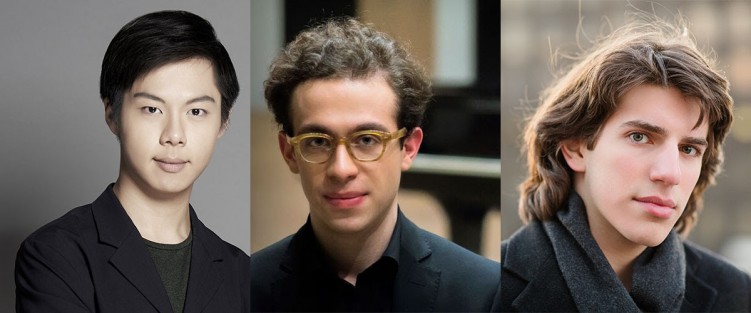 CALGARY—This sun-splashed city, with dry air and moderate temperatures, has been opening its arms to the 2018 Honens International Piano Competition. We now enter the home stretch, with the winner (“Laureate”) to be declared late Friday night. In the meantime, the ten semifinalists from nine countries have been narrowed to a field of three finalists by a seven-member jury.
CALGARY—This sun-splashed city, with dry air and moderate temperatures, has been opening its arms to the 2018 Honens International Piano Competition. We now enter the home stretch, with the winner (“Laureate”) to be declared late Friday night. In the meantime, the ten semifinalists from nine countries have been narrowed to a field of three finalists by a seven-member jury.
The standard of piano-playing has been extremely high throughout.
I attended every round of the semifinals: 10 in all, beginning August 30. Competitors were obliged to play 65-minute solo recitals, plus 65-minute collaborative recitals with baritone Phillip Addis and violinist Jonathan Crow.
The competition is engaging a devoted audience that listens intently in the Jack Singer Concert Hall, quietly exchanging views in the lobby at intermissions. Is there something about Calgary and virtuoso piano-playing? After all, this city’s Mount Royal College is where the young Yuja Wang, keyboard phenomenon from China, first studied in North America.
Meanwhile, related events of the Honens Festival, including a series of masterclasses, have attracted young people to educational events and to piano recitals across town. The finals on Friday evening will enlist the Azahar Ensemble, a woodwind quintet.
Pianist Garrick Ohlsson, this year’s “Mentor in Residence,” played a substantial recital of Brahms and Chopin Tuesday evening. Ohlsson is now working with the competitors, sharing musical and professional wisdom. His playing remains masterly, allying technical brilliance with mature expansiveness.
Of course, competitions by nature invite disagreement with the decisions made, and this edition of the Honens has been no exception.
The announcement of the three finalists late on Labour Day didn’t include the name of the competitor who struck me as the most eloquent, musicianly and promising: Philipp Scheucher, 25, from Austria. Given the nature of these events, I assumed he might not emerge as the ultimate winner of the $100,000 CAD first prize, plus an Artist Development Program whose details have yet to be revealed. But I was quite sure he would at least advance to the finals. In Liszt’s B-minor Sonata, Scheucher negotiated the sprawling rhetoric with virtuosity, poetry, individuality and abandon. The final section – from the fugato to the concluding bass note – was delivered via an unassailable musical impulse.
Before that, his haunting account of Ravel’s “Oiseaux Tristes” from Miroirs, and some stylish Mozart, to me spelled “finalist.” In the collaborative round, a stimulating program of Beethoven, Schoenberg, Webern and Schubert reinforced the impression.
But it was not to be.
The three finalists?
Han Chen (Taiwan), 26, delivered a staggeringly brilliant account of Liszt’s Reminiscences of Don Juan. He confirmed his sterling credentials as an exponent of contemporary music by juxtaposing the Liszt Don Juan Fantasy with four concert paraphrases by Thomas Adès (b. 1971) on his opera Powder Her Face. Despite some over-the-top arm and hand gestures and a rendition of Schubert’s late C-minor Sonata, D. 958 that could have shown more in terms of structural articulation and lyrical impulse, Chen’s playing was sensational.
The collaborative round showcased Chen’s wonderful performance of a Britten suite with Crow. They also essayed the early Sonata for Violin and Piano (1963) by John Corigliano, a piece that, for me, even expert advocacy couldn’t quite “sell.” Still, the collaborative performances entailed very limited rehearsal time, underlining the quality of what was achieved.
Of the other two finalists, Nicolas Namoradze, 26, from Georgia, offered three of his own études, displaying a keen grasp of the instrument’s capabilities and plenty of imagination. As a composer and film soundtrack producer as well as pianist, his intellect and gifts are in no doubt. But I found his solo Bach (E-minor Partita) and stage presence uncomfortably tentative, and his collaborative round was less assured than the solo.
The youngest (at 21) finalist, Llewellyn Sanchez-Werner (U.S.), boldly tackled Beethoven’s final Piano Sonata, Opus 111. This followed his brilliant performances of five Liszt Transcendental Etudes, and a contemporary piece. Few pianists manage to scale the heights of Opus 111 at such a tender age, and Sanchez-Werner was no exception, indulging in some odd distensions of tempo and caressing and emoting over individual notes, which weakened the structure. The ineffable Finale also needed conceptual tightening. Was it worth the risk of taking this piece in its current state of readiness to such a high-stakes competition? The jury clearly thought it was.
The Honens’ choice of a “Laureate” will be an updated self-definition of how it sees itself on the world stage, since the eventual winner will carry the competition’s reputation internationally.
The performances are all archived at www.honens.com/livestream. Stay tuned…my next report will come after the jury announces its verdict late Friday.
Stephen Cera, a pianist, journalist and concert programmer, played recitals with Jacques Israelievitch not long before the untimely death of the late TSO concertmaster. He lectures widely about music, writes about international classical music events for MusicalAmerica.com, and maintains a blog at www.stephencera.com.



